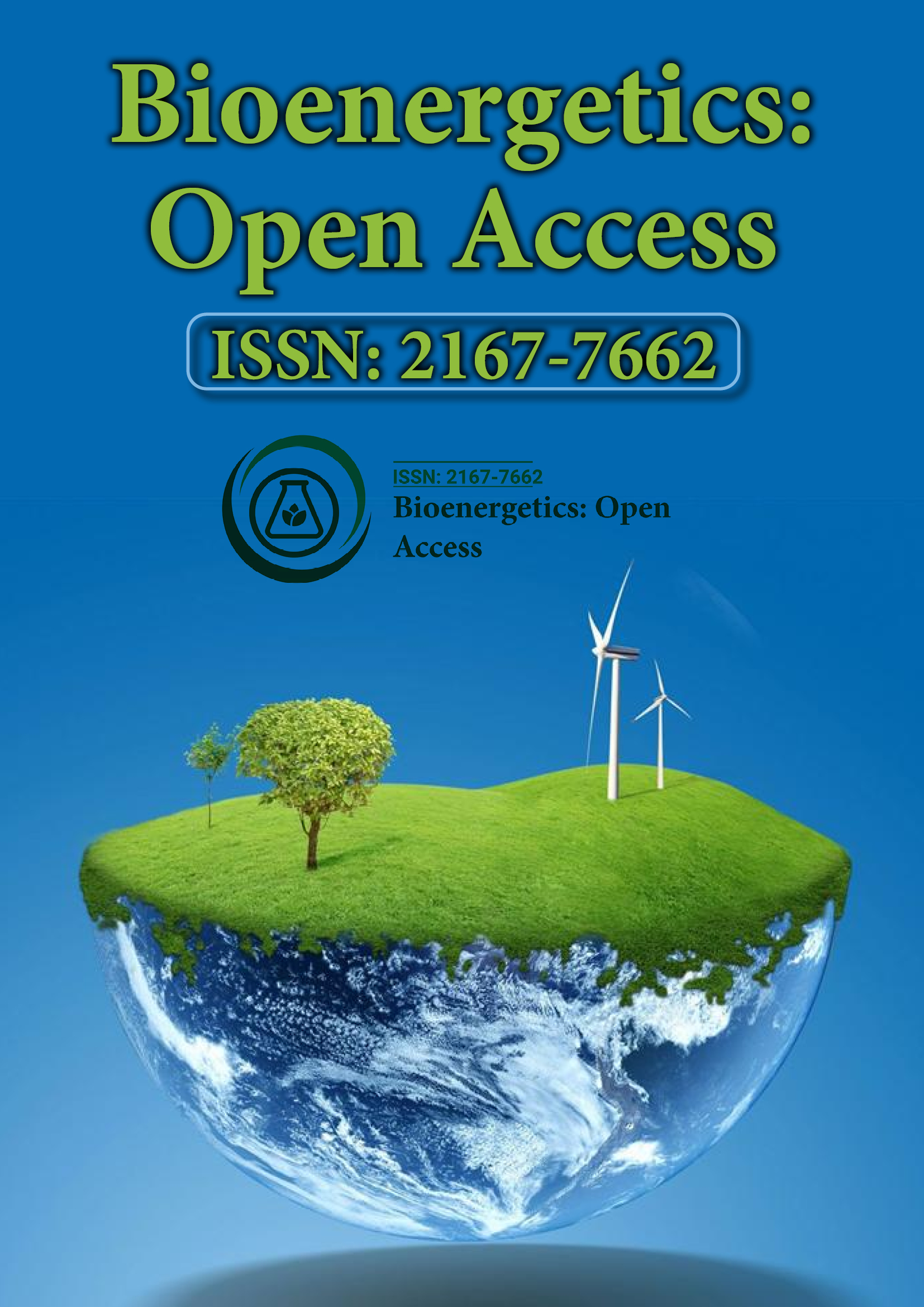ఇండెక్స్ చేయబడింది
- J గేట్ తెరవండి
- జెనామిక్స్ జర్నల్సీక్
- అకడమిక్ కీలు
- పరిశోధన బైబిల్
- RefSeek
- రీసెర్చ్ జర్నల్ ఇండెక్సింగ్ డైరెక్టరీ (DRJI)
- హమ్దార్డ్ విశ్వవిద్యాలయం
- EBSCO AZ
- OCLC- వరల్డ్ క్యాట్
- విద్వాంసుడు
- పబ్లోన్స్
- యూరో పబ్
- గూగుల్ స్కాలర్
ఉపయోగకరమైన లింకులు
ఈ పేజీని భాగస్వామ్యం చేయండి
జర్నల్ ఫ్లైయర్

యాక్సెస్ జర్నల్స్ తెరవండి
- ఆహారం & పోషకాహారం
- ఇంజనీరింగ్
- ఇమ్యునాలజీ & మైక్రోబయాలజీ
- క్లినికల్ సైన్సెస్
- జనరల్ సైన్స్
- జెనెటిక్స్ & మాలిక్యులర్ బయాలజీ
- నర్సింగ్ & హెల్త్ కేర్
- న్యూరోసైన్స్ & సైకాలజీ
- పర్యావరణ శాస్త్రాలు
- ఫార్మాస్యూటికల్ సైన్సెస్
- బయోఇన్ఫర్మేటిక్స్ & సిస్టమ్స్ బయాలజీ
- బయోకెమిస్ట్రీ
- మెటీరియల్స్ సైన్స్
- మెడికల్ సైన్సెస్
- రసాయన శాస్త్రం
- వెటర్నరీ సైన్సెస్
- వ్యవసాయం మరియు ఆక్వాకల్చర్
- వ్యాపార నిర్వహణ
నైరూప్య
మైక్రో-, ల్యాబ్-, పైలట్- మరియు ఇండస్ట్రియల్ స్కేల్ బేస్డ్ బయోకెటలిటిక్ ప్రక్రియల ద్వారా జీవ ఇంధనాల ఉత్పత్తి
బ్రూనో జెలిక్
శిలాజ ఇంధనాల లభ్యత మరియు అందుబాటు గణనీయంగా తగ్గుతున్నందున వివిధ పునరుత్పాదక వనరుల నుండి జీవ ఇంధనాల ఉత్పత్తి ఆవశ్యకత మరింత ఆసక్తికరంగా మారుతోంది. బయోడిగ్రేడబిలిటీ, తక్కువ కాలుష్య ఉద్గారాలు మరియు నాన్-టాక్సిసిటీ మరియు బయోఇథనాల్ మరింత పర్యావరణ అనుకూల ఇంధనాలు. ఘన-స్థితి పదార్థాలు, ఇది ఆర్థికంగా కూడా సాధ్యమయ్యేలా చేస్తుంది. ఇప్పటివరకు, ఈ సాంకేతికత ఎంజైమ్లు, సేంద్రీయ ఆమ్లాలు, పుట్టగొడుగులు, రుచి మరియు సుగంధ సమ్మేళనాలు, పిగ్మెంట్లు, పాలీసాకరైడ్లు, హార్మోన్లు, మానవ ఆహారం మరియు పశుగ్రాసం ఉత్పత్తికి ఉపయోగించబడింది. వివిధ రకాలైన బయోఇయాక్టర్లు అభివృద్ధి చేయబడ్డాయి మరియు విస్తృత శ్రేణి సబ్స్ట్రేట్ల ఘన-స్థితి కిణ్వ ప్రక్రియ కోసం మరియు విలువ-ఆధారిత ఉత్పత్తుల ఉత్పత్తిలో విజయవంతంగా ఉపయోగించబడ్డాయి. ల్యాబ్-, పైలట్- మరియు ధాన్యం, పాలవిరుగుడు మరియు ఆవు పేడ, మరియు మొక్కజొన్న సైలేజ్ మరియు ఆవు ఎరువుపై వాయురహిత క్షీణతలో భాగంగా ఘన-స్థితి కిణ్వ ప్రక్రియ ప్రదర్శించబడుతుంది, బయోడీజిల్ ఉత్పత్తి ప్రక్రియను తీవ్రతరం చేయడంలో విస్తృతంగా అధ్యయనం చేయబడుతుంది. అయినప్పటికీ, రసాయన ఉత్ప్రేరకాల యొక్క మైక్రోతే ఉపయోగం యొక్క మునుపటి అధ్యయనాలు. తేలికపాటి ప్రతిచర్య పరిస్థితులు, ఉప-ఉత్పత్తులు లేకపోవడం, పునర్వినియోగం, ఫలితంగా బయోడీజిల్ను సరళంగా వేరు చేయడం మరియు శుద్ధి చేయడం, అలాగే తక్కువ శక్తి వినియోగం,
ఎంజైమ్ లైపేస్ను చేసే అనేక ప్రయోజనాలు - బయోకెటలిస్ట్ - సాంప్రదాయ రసాయన ఉత్ప్రేరకాల కంటే మెరుగైన ఎంపిక. బయోడీజిల్ ఉత్పత్తి ప్రక్రియలో. వాణిజ్యపరంగా లభించే లైపేస్ మరియు సాలిడ్-స్టేట్ కిణ్వ ప్రక్రియ ద్వారా ఉత్పత్తి చేయబడిన లైపేస్ని ఉపయోగించే వివిధ మైక్రోరియాక్టర్ సిస్టమ్లు తాజా మరియు వ్యర్థ వంట నూనెల ట్రాన్స్స్టెరిఫికేషన్ కోసం ఉపయోగించబడ్డాయి, అయితే బయోడీజిల్ ఇంటిగ్రేటెడ్ మైక్రో సెపరేషన్ యూనిట్ను ఉపయోగించి వేరు చేయబడింది. ఎంచుకున్న ఉదాహరణలు సూక్ష్మ-, ల్యాబ్-, పైలట్- మరియు పారిశ్రామిక స్థాయిలో జీవ ఇంధనాల సమర్ధవంతమైన ఉత్పత్తికి ఉపయోగించే పర్యావరణ అనుకూలమైన మరియు ఆర్థిక సాంకేతికతలకు స్పష్టమైన ప్రదర్శన.